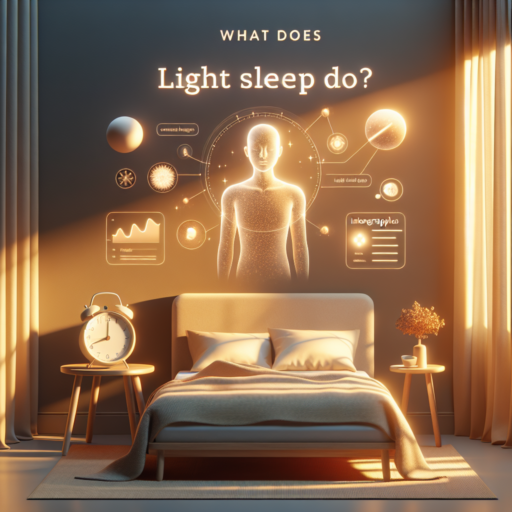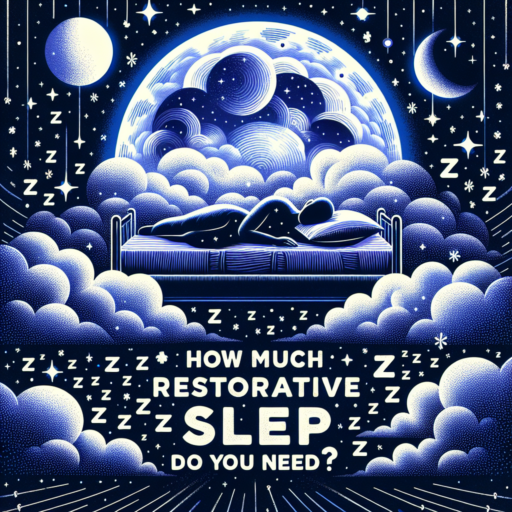Understanding Light Sleep and Its Importance for Health
When we dive into the complexities of sleep, we often hear about the vital roles of deep sleep and REM (Rapid Eye Movement) sleep. However, light sleep, a stage often overlooked, plays a crucial role in our overall sleep architecture and health. Light sleep acts as a transition phase between being awake and the deeper stages of sleep, and it encompasses a significant portion of our night.
The Function of Light Sleep
During light sleep, our bodies start the process of slowing down, with heart rates and breathing rates reducing as we ease into this initial stage of sleep. It’s here that our bodies begin the reparative work that’s so essential to our well-being. Despite being a lighter phase, it contributes significantly to memory consolidation, learning, and emotional regulation. Moreover, light sleep prepares us for the deeper, more restorative stages, ensuring we cycle through the sleep stages effectively.
Enhancing Health through Improved Light Sleep
Improving the quantity and quality of light sleep can have noticeable benefits on our health. For starters, enhanced light sleep can lead to better cognitive function and emotional balance. Strategies to improve this stage of sleep include maintaining a consistent sleep schedule, creating a bedtime routine that promotes relaxation, and optimizing your sleep environment for comfort and minimal disturbances. By prioritizing light sleep, we’re essentially investing in our body’s ability to perform repairs and maintain well-being.
How Does Light Sleep Affect Your Body and Mind?
Light sleep, often considered a less crucial phase of the sleep cycle, plays a significant role in how our body and mind function. During this stage, our bodies are in a state of transition, drifting in and out of sleep, which can have various impacts on our overall well-being.
Firstly, light sleep assists in memory consolidation. Our brain processes and filters a multitude of information received throughout the day. However, consistent interruptions or an abundance of light sleep may inhibit the brain’s ability to perform these tasks efficiently. This disruption can lead to challenges in retaining new information or learning new skills, affecting our cognitive functions and daily performance.
Mentally, light sleep influences our emotional equilibrium. It acts as a reset for our mood and stress levels, laying the groundwork for deeper sleep stages that promote emotional resilience. When deprived of enough deep sleep, because of excessive light sleep, individuals might experience heightened anxiety, irritability, or mood swings. Consequently, the quality of light sleep can indirectly shape our mental health and emotional stability.
The Role of Light Sleep in the Sleep Cycle
Understanding the intricacies of the sleep cycle is crucial for recognizing the significance of each stage, including light sleep. Light sleep acts as a transitional phase, paving the way for deeper stages of sleep. However, its role is often underestimated and overshadowed by the emphasis on deep sleep and REM (Rapid Eye Movement) sleep for overall health and wellbeing.
Light sleep, typically characterized by a reduction in heart rate and breathing rhythm, occupies a substantial portion of the sleep cycle. This stage is essential not only as a transition but also for cognitive processing, memory consolidation, and the restoration of brain function. It serves as a foundational layer that enhances the quality of deeper sleep stages.
Key Functions of Light Sleep
- Promotes relaxation and decreases bodily functions preparing the body for deep sleep
- Facilitates cognitive processing and memory consolidation
- Serves as a checkpoint for the body to evaluate whether to progress to deeper sleep stages or rouse slightly in response to disturbances
The misconception that light sleep is less important minimizes the critical role it plays in overall health. Emphasizing the importance of each stage of the sleep cycle, including light sleep, can lead to a more comprehensive understanding of sleep’s impact on health and encourage practices that support all stages of sleep.
No se han encontrado productos.
Benefits of Light Sleep: More Than Just Rest
Light sleep, often underestimated in its importance, plays a critical role in our sleep cycles. Unlike deep sleep, which is often highlighted for its restorative benefits, light sleep serves as a bridge and has its own unique advantages that contribute to our overall well-being. Understanding these benefits can help us appreciate every stage of our sleep cycle and its impact on our health.
Improves Memory and Learning
One of the key benefits of light sleep is its role in the consolidation of memory and learning. During this phase, our brain processes and synthesizes new information, making it an essential component for cognitive health. This stage of sleep helps in transferring information from short-term to long-term memory, reinforcing the learning process and making it easier for us to recall information later.
Supports Physical Recovery
While deep sleep is most often associated with physical repair, light sleep also contributes to physical recovery and health. It plays a role in tissue repair, muscle growth, and overall recovery from physical exertion. This stage ensures that our body is gradually preparing for the deeper stages of rest, making it just as important for athletes and anyone engaging in regular physical activity.
Comparing Light Sleep, Deep Sleep, and REM: What’s the Difference?
Understanding the intricacies of our sleep cycles can shed light on the importance of each phase for our overall wellness. When we talk about sleep, it gets categorized mainly into three types: Light Sleep, Deep Sleep, and Rapid Eye Movement (REM) Sleep. Each of these stages plays a unique role in the restoration and rejuvenation of our body and mind. Let’s delve into what sets each of these phases apart from the other.
Light Sleep: The Gateway Phase
Light sleep marks the transition between wakefulness and sleep, acting as a gateway to the deeper stages of sleep. During this phase, which constitutes the majority of our sleeping time, our body begins to relax, our heartbeat and breathing rate slow down, and our muscles loosen up. This stage is essential for memory consolidation and acts as a foundation for entering deeper sleep phases.
Deep Sleep: The Restoration Stage
As we progress into Deep Sleep, our body enters a state of significant physiological repair. This includes muscle growth, tissue repair, and the release of growth hormones essential for overall health. Deep sleep is also critical for immune system strengthening and energy restoration. Unlike light sleep, this stage makes it harder for us to wake up, indicating its importance in physical recovery and brain detoxification.
REM Sleep: The Dream Phase
Finally, REM sleep, often referred to as the dream phase, is where most of our dreaming occurs. This phase is characterized by heightened brain activity, rapid eye movements, and temporary muscle paralysis. REM sleep plays a crucial role in emotional regulation, memory consolidation, and learning. Its unique nature supports cognitive functions and can influence mood and mental health.
Improving Light Sleep: Tips and Techniques for Better Health
Light sleep, a crucial phase in the sleep cycle, plays a vital role in our physical and mental health. Enhancing the quality of light sleep can lead to improved overall health, greater energy levels, and enhanced mood. Employing specific tips and techniques can make a significant difference. Below, we explore some of the most effective strategies to enrich your light sleep stage, ensuring you wake up feeling refreshed and rejuvenated.
Establishing a Relaxing Bedtime Routine
Creating a calming pre-sleep ritual is key to transitioning your body and mind into a state conducive to light sleep. Consider activities such as reading a book, taking a warm bath, or practicing meditation. These activities help slow down your body’s systems and prepare it for a night of restful sleep. Incorporating such routines nightly trains your brain to recognize these signals as cues to wind down, significantly improving the quality of your light sleep.
Optimizing Your Sleep Environment
The environment in which you sleep can dramatically impact the quality of your light sleep. Factors to consider include the comfort of your mattress and pillows, the room temperature, and the levels of noise and light. A cool, dark, and quiet room is ideal for fostering sound sleep. It’s also beneficial to invest in quality bedding that supports your body comfortably, ensuring that you can move easily into deeper stages of sleep without disturbance.
Evaluating and adjusting these aspects of your bedtime routine and sleep environment can lead to notable improvements in your light sleep quality. Emphasizing the importance of light sleep is essential for anyone looking to improve their health and wellbeing through better sleep practices.
How to Track and Analyze Your Light Sleep for Better Rest
Understanding Light Sleep and Its Importance
Light sleep, often overlooked in sleep quality discussions, plays a pivotal role in our sleep cycle. It serves as the transition phase between wakefulness and deeper sleep stages, contributing to mental and physical restoration. Recognizing the hallmarks of light sleep and its significance can provide valuable insights into achieving more restful nights. Monitoring patterns in this sleep stage can help identify disruptions and enhance overall sleep health.
Methods for Tracking Light Sleep
Advancements in technology have made tracking light sleep more accessible than ever. Utilizing wearable devices like smartwatches and fitness trackers can offer detailed insights into your sleep stages, including the duration and quality of your light sleep. These devices employ sensors to monitor movements and physiological signals, distinguishing between different sleep stages. Moreover, smartphone apps dedicated to sleep tracking present another feasible option, using microphone and accelerometer readings to analyze sleep patterns.
Analyzing Your Light Sleep Data
Having accumulated data on your light sleep, the next step involves analysis to pinpoint areas for improvement. Look for patterns such as the time it takes to fall into light sleep or the frequency of disruptions. Such analysis can illuminate factors adversely affecting your light sleep, like stress or irregular sleep schedules. By understanding these patterns, you can implement targeted changes to your bedtime routine, such as relaxation techniques or adjusting your sleep environment, aiming for a more harmonious sleep cycle.
Can Enhancing Light Sleep Improve Your Alertness During the Day?
Many people are curious about how different sleep stages affect their daily performance. Light sleep, often undervalized in discussions about rest, plays a crucial role in our sleep cycle. Enhancing the quality of light sleep could be key to improving alertness during the day. This stage of sleep serves as a transition between deep sleep and wakefulness, making its optimization crucial for feeling refreshed.
Studies suggest that increased light sleep can lead to better cognitive function and mood stabilization. While deep sleep focuses on physical recovery, light sleep is pivotal for processing memories and emotions. By optimizing the conditions for light sleep, such as maintaining a consistent sleep schedule and creating a conducive sleep environment, individuals might notice an improvement in their day-to-day alertness and performance.
Another aspect to consider is the use of technology before bedtime, which can significantly disrupt light sleep. Exposure to blue light emitted by screens can hinder the production of melatonin, a hormone essential for promoting sleep. By reducing screen time before bed and adopting a relaxation routine, one may enhance the quality of light sleep, thereby potentially boosting alertness throughout the day.
Common Myths and Misconceptions About Light Sleep Debunked
When it comes to understanding sleep, many people find themselves tangled in a web of myths and misconceptions, particularly about light sleep. It’s crucial to clear the air and debunk these myths to improve our sleep quality and overall health.
Myth #1: Light Sleep Isn’t Important
One common misconception is that light sleep isn’t as vital as deep or REM sleep. However, light sleep plays a significant role in memory consolidation and physical recovery. It acts as a bridge connecting all stages of the sleep cycle, ensuring a seamless transition and optimal brain function.
Myth #2: You Don’t Need Much Light Sleep
Another myth suggests that you don’t need much light sleep. On the contrary, light sleep constitutes the majority of our sleep cycle, making it essential for a restful night. It helps with mental and physical restoration, preparing the body for the deeper stages of sleep.
Understanding the truths behind light sleep can transform our approach to rest and debunking these myths is the first step. By valuing all stages of sleep, we pave the way for better health and well-being.
The Science Behind Light Sleep: What Research Says
Understanding light sleep, an essential component of the human sleep cycle, offers fascinating insights into our overall health and well-being. This stage, formally known as the NREM Stage 1 sleep, acts as a bridge between wakefulness and deeper sleep stages. Research has highlighted its importance for memory consolidation, mood regulation, and even impacting our reaction times.
Characteristics of Light Sleep
During light sleep, the brain begins to slow down, with slower theta waves becoming prominent. It’s a period where the sleeper is easily awakened, which signifies the body’s preparation for deeper sleep stages. Studies indicate that an average adult spends about 50% of their sleep time in this stage, underscoring its significant role in the sleep cycle. Researchers believe that light sleep serves as a period of neurological cleansing, where the brain disposes of irrelevant information accumulated throughout the day.
The Role of Light Sleep in Learning and Memory
Recent studies shed light on the crucial role of light sleep in cognitive functions, particularly in learning and memory. Though deeper sleep stages are primarily associated with memory consolidation, light sleep appears to facilitate the initial processing and transition of information into long-term memory banks. This function is vital for learning efficiency and overall cognitive health, indicating the nuanced roles different sleep stages play in memory consolidation processes.




